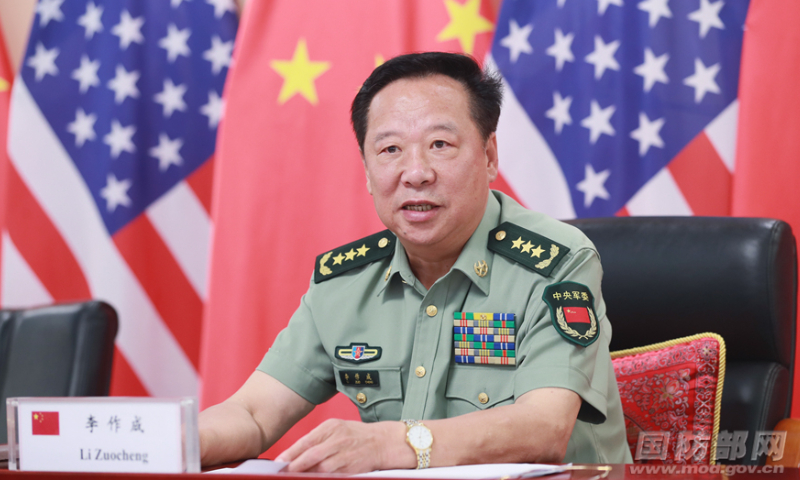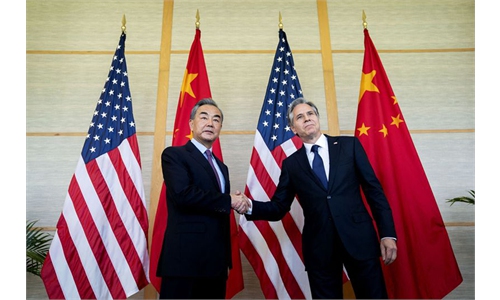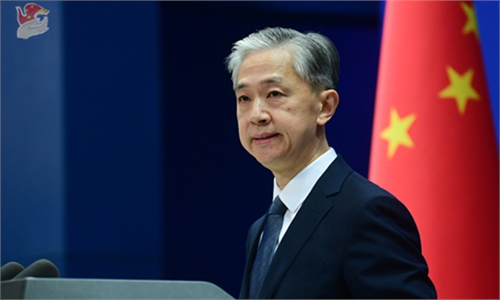Chinese general stresses no compromise on China's core interest with US counterpart in 4th bilateral high-level contact in a month

Chief of the Central Military Commission Joint Staff Department, General Li Zuocheng Photo: mod.gov.cn
Chief of the Central Military Commission (CMC) Joint Staff Department, General Li Zuocheng, spoke with US General Mark Milley, Chairman of the Joint Chief of Staff, under the latter's invitation on Thursday, reaching a consensus that it is in the common interest of both countries to maintain stable development of military-to-military relations and avoid conflicts and confrontations.
But the Chinese general also stressed that on issues concerning China's core national interests, there is no room for compromise. If anyone wantonly provokes, the Chinese people will respond firmly.
The phone call came after the US sought help from China to ease its economic pressure, hinting that it may ease tariffs on Chinese goods and engage in dialogue with senior Chinese officials more often. It also came ahead of Chinese State Councilor and Foreign Minister Wang Yi's meeting with US Secretary of State Antony Blinken during the meeting of G20 foreign ministers.
It is the fourth contacts of Chinese and US senior officials in the past 30 days.
Such frequent communications between senior officials of the two sides show that China and the US are making efforts to manage the differences and competition to prevent escalation caused by miscalculations, analysts said.
Li, a member of the Central Military Commission (CMC) and chief of staff of the CMC Joint Staff Department, said Chinese President Xi Jinping stressed China and the US should respect each other, coexist peacefully and cooperate for win-win results. China attaches great importance to US President Joe Biden's positive remarks of "five assurances" on many occasions.
"As long as we follow the strategic guidance of the two state leaders and implement the important consensus reached by them, China and the US can achieve common development and mutual achievements," Li said. "Under the current circumstances, the two militaries should uphold mutual respect, an objective and rational attitude, further strengthen dialogue, manage risks and promote cooperation, rather than deliberately creating confrontation, provoking trouble and mutual exclusion."
"China urges the US to abide by the One-China principle and the provisions of the three joint communiques, stop turning the clock back on history and stop the military collusion between the US and the island of Taiwan to avoid undermining China-US relations and stability across the Taiwan Straits. The Chinese military will resolutely safeguard national sovereignty and territorial integrity," Li said.
On June 10, Chinese and US defense chiefs held their first face-to-face meeting in Singapore, with Chinese State Councilor and Defense Minister General Wei Fenghe reiterating China's firm position on the Taiwan question, stressing the Chinese military will not hesitate to fight, and will resolutely crush any "Taiwan independence" attempts to firmly safeguard national sovereignty and territorial integrity.
Senior Colonel Wu Qian, a spokesperson of China's Ministry of National Defense, said at a press conference after the meeting that it is of significance to implementing the important consensus between the two countries' top leaders and pushing forward the development of the two countries' military ties. It was a frank, positive and constructive strategic communication.
Three days later, Member of the Political Bureau of the CPC Central Committee and Director of the Office of the Central Commission for Foreign Affairs Yang Jiechi met with US National Security Advisor Jake Sullivan in Luxembourg. The two sides had candid, in-depth and constructive communication and exchanges on China-US relations and other issues of common concern, and agreed to focus on following through on the consensus reached by the heads of state of the two countries to strengthen contact and dialogue, reduce misunderstanding and miscalculation, and properly manage differences.


